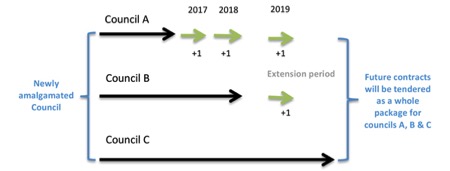By Dr Ron Wainberg, Technical Director MRA Consulting, and Kiera Crosariol, Environmental Consultant
As New South Wales council amalgamations take effect, the councils impacted will have to plan for eventual integration of their residential and commercial waste services.
Waste management often represents the largest long term contractual commitment for a Local Government Area (LGA), and the level of service provided during periods of transition are crucial for sustaining resident approval.
Waste services can also be a polarising and politically charged topic. Residents can react strongly to changes to their waste collection services without proper consultation.
Evidently, as individual councils join, it is imperative that they consider how they are going to manage waste management services for their new and expanded local community.
Challenge 1 Harmonising Service Types
Most council services are bespoke and service their particular community differently.
The size and type of bins used can vary significantly between neighbouring councils and can include combinations of the following non-garbage services:
• Recycling: crates; crop off centres; paper and cardboard bins; and containers (comingled) bins.
• Organics: bundled verge clean ups; mulching services; food trial bins; on-site processing; home composting; garden organics bins; and food and garden organics bins.
To complicate things further, councils have also adopted different methods and frequencies for collection, and have unique hard waste management contracts in place.
Challenge 2 Contract Timing
Waste collection and disposal contracts will terminate at different points in time, and finding a pathway for their integration into one master contract covering the entire amalgamated LGA will require careful consideration and planning.
There are a number of factors to be considered:
• Existing contract requirements including contamination rates and waste characterisation
• Maximum number of extensions and their duration
• Inclusion or exclusion of change in law clauses
• Compliance with the Local Government Act
• Existing collection schedules and how routes will change under one contract
• Types of mobile waste bins
• The size and number of bins to distribute
• The current hard waste collection options available and
• The existing processing contracts for all waste streams and facility capacity.
The Path Forward
The dual challenge is to manage resident expectations and the timing of the service integration. Proactive councils that consult with their community and conduct comprehensive research into best practice, particularly for hard waste collection, are more likely to minimise community concern.
Councils should determine if they are able to exercise optional contract extensions and enter into transitional arrangements that see each part of the newly amalgamated council integrated into one master contract over time, as shown in the diagram above.
It is important to note that waste service providers can happily work within a staggered contract. Furthermore, the purchase of new trucks or bins is assisted by a staggered commencement date.
It is a myth that all contracts have to start and finish together. Contracts can be developed that allow for the phased incorporation of different areas within a single contract or to progressively bring various services ‘inherited’ from the previous councils into one integrated service or to leave them independent.
Done well, an amalgamated LGA can reap several benefits including potential savings through economies of scale, a larger pool of resources to get things done, and a more uniform service model across the community.
To find out more about council amalgamations and the impact on waste and recycling services – and how to make the transition as seamless as possible for both residents and councils – register now to attend this year’s Australasian Waste & Recycling Expo (AWRE).
On Day 1 of the Expo, Managing Director of MRA Consulting, Mike Ritchie, will be joined by Jennifer Hughes from Baker McKenzie, Les Andrews and Daniela Santucci from the City of Canterbury-Bankstown, and Mark McKenzie from Local Government NSW for an informative and insightful discussion about the challenges and opportunities in council amalgamations.
–
AWRE will be held from 10 to 11 August at the Sydney Showground.








